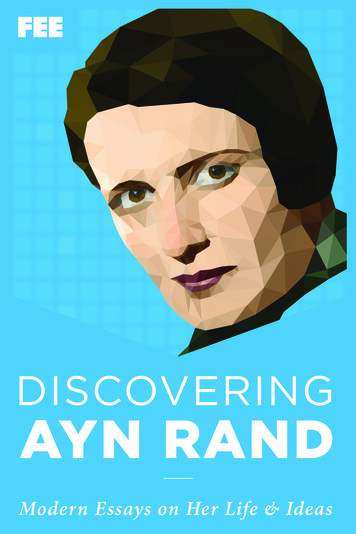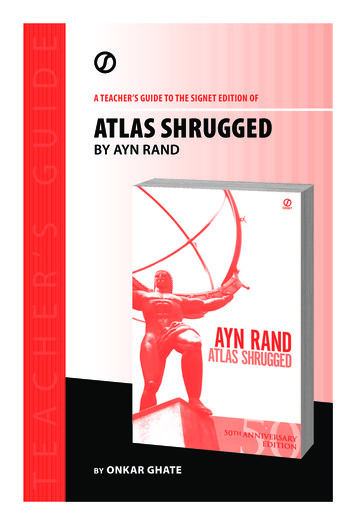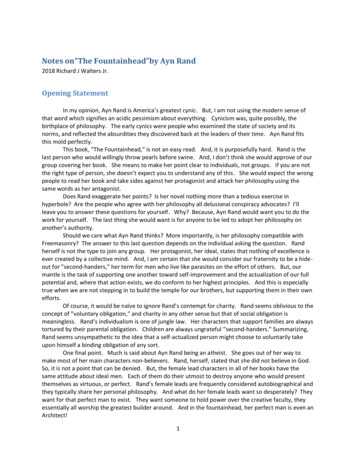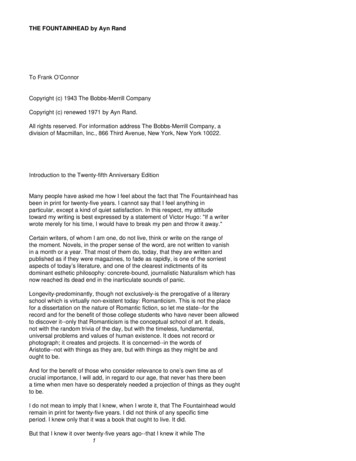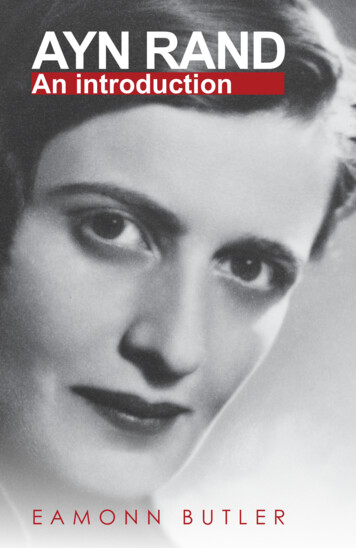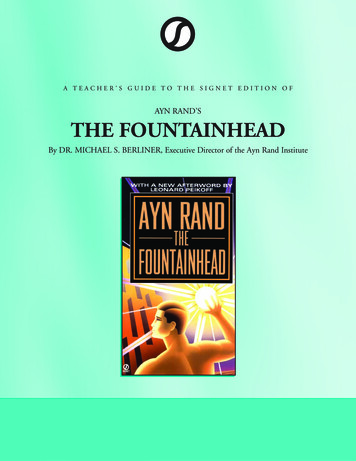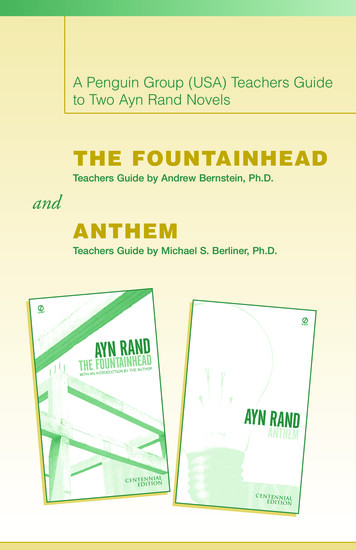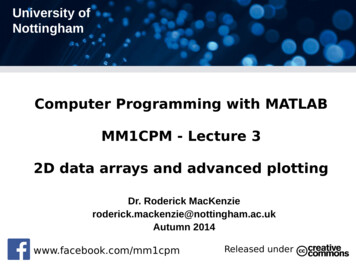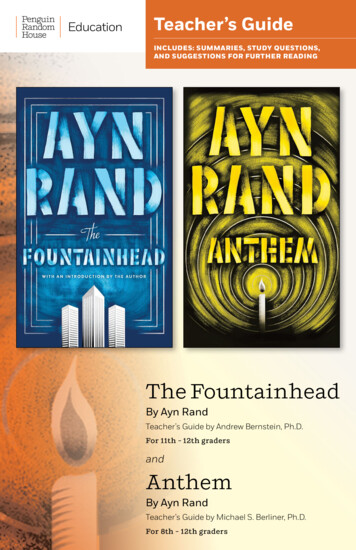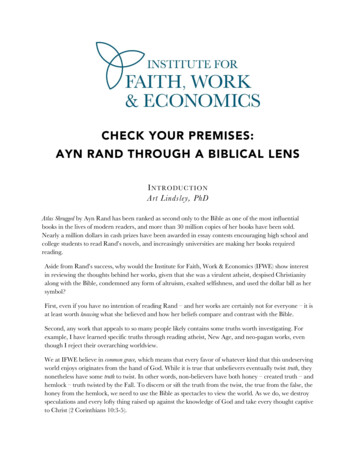
Transcription
CHECK YOUR PREMISES:AYN RAND THROUGH A BIBLICAL LENSI NTRODUCTIONArt Lindsley, PhDAtlas Shrugged by Ayn Rand has been ranked as second only to the Bible as one of the most influentialbooks in the lives of modern readers, and more than 30 million copies of her books have been sold.Nearly a million dollars in cash prizes have been awarded in essay contests encouraging high school andcollege students to read Rand’s novels, and increasingly universities are making her books requiredreading.Aside from Rand’s success, why would the Institute for Faith, Work & Economics (IFWE) show interestin reviewing the thoughts behind her works, given that she was a virulent atheist, despised Christianityalong with the Bible, condemned any form of altruism, exalted selfishness, and used the dollar bill as hersymbol?First, even if you have no intention of reading Rand – and her works are certainly not for everyone – it isat least worth knowing what she believed and how her beliefs compare and contrast with the Bible.Second, any work that appeals to so many people likely contains some truths worth investigating. Forexample, I have learned specific truths through reading atheist, New Age, and neo-pagan works, eventhough I reject their overarching worldview.We at IFWE believe in common grace, which means that every favor of whatever kind that this undeservingworld enjoys originates from the hand of God. While it is true that unbelievers eventually twist truth, theynonetheless have some truth to twist. In other words, non-believers have both honey – created truth – andhemlock – truth twisted by the Fall. To discern or sift the truth from the twist, the true from the false, thehoney from the hemlock, we need to use the Bible as spectacles to view the world. As we do, we destroyspeculations and every lofty thing raised up against the knowledge of God and take every thought captiveto Christ (2 Corinthians 10:3-5).
Third, because all truth is God’s truth, we need to learn anything and everything we can, because eachparticular truth will lead us ultimately to God’s truth. We need fear nothing from this endeavor. Wecertainly don’t need to fear reading the works or examining the thoughts of an atheist. We have alreadysuffered too much from ignorance. Our faith, after all, can stand up to the most rigorous examination.David Kotter’s study of Ayn Rand is a helpful analysis of the honey and hemlock in Rand’s views. If weare going to be like the children of Issachar who understand our times (1 Chron. 12:32), it will be wise toknow what is good and evil, true and false, about a leading influencer of modern thought.Art Lindsley, Ph.D. is the Vice President of Theological Initiatives at the Institute for Faith, Work &Economics. Copyright 2012 Institute for Faith, Work & Economics
CHECK YOUR PREMISES:AYN RAND THROUGH A BIBLICAL LENSDavid S. KotterThis study examines the four major novels of Ayn Rand along with secondary literature to evaluate herwork through a biblical lens. It begins with a brief biography of her life, a summary of her significantcontributions, and an overview of her philosophy Objectivism. The primary analysis of Rand’s philosophyfirst finds a significant overlap between Ayn Rand’s understanding of selfishness as the highest virtue witha biblical view of self-interest. Rand’s disdain for altruism agrees with the Bible with respect to a capitalisteconomy but diverges in light of a biblical understanding of the family. Second, her anthropologicalcategories (individualists vs. collectivists, and creators vs. second-handers) are both helpful and largelyconsistent with the Bible, though Ayn Rand’s view of gender and sexuality deviates from a biblicalunderstanding in disturbing ways. Third, while Ayn Rand’s atheism is antithetical to the biblicalworldview, there are remarkable areas of overlap, and her projection of an ideal man bears an uncannyresemblance to Jesus Christ.“Check your premises!” was a favored rejoinder of Ayn Rand during conversations and debates, and thisimperative frequently preceded a withering barrage of logic aimed at the weakest points of herinterlocutor. In this spirit, it is appropriate to review the premises evident in Ayn Rand’s writing using abiblical lens for perspective.i Such an exercise is valuable because of the wide and ongoing influence ofAyn Rand.Rand, a Russian-born American novelist, remains one of the most prominent business philosophersdecades after her death in 1982. More than 30 million copiesii of her novels Atlas Shrugged, The Fountainhead,We the Living, and Anthem have been sold. Her book sales tripled during the recent financial crisis, and AynRand’s influence continues to grow.iii The Modern Library Reader’s List of the 100 best novels includesall of Rand’s titles in the top ten, with the 1,075 page masterwork Atlas Shrugged sitting at the top.iv Whenresearchers conducting a study for the Library of Congress asked readers, “What one book mostinfluenced your life?” Atlas Shrugged was second in influence only to the Bible.v More than 75 years afterher first publication, every book published by Ayn Rand is still in print.viThese book sales are evidence that Rand’s philosophy deeply resonates with many readersvii and thatmillions agree with her vision of “man as a heroic being, with his own happiness as the moral purpose ofhis life, with productive achievement as his noblest activity, and reason as his only absolute.”viii Copyright 2012 Institute for Faith, Work & Economics
Specifically, her philosophical system, Objectivism, contends that collective altruism is evil and that thehighest virtue of man is the capitalistic pursuit of rational self-interest.Rand’s philosophy is being taught to a new generation, and some of her books are mandatory reading atmany high schools.ix Further, her philosophy is being actively promoted by the Ayn Rand Institutethrough Objectivist programs at high schoolsx and colleges.xi Her philosophy is especially influential ingraduate business schools where earning a degree from a leading school is transformational, and even“forges a new identity as a permanent member of the business elite.”xii In the academy, scholars debateObjectivist philosophy and explicate Rand’s life in the peer-reviewed Journal of Ayn Rand Studies.After college, tens of thousands of Rand admirers network and share ideas (even date and fall in love)through an online organization called the “Altasphere.”xiii Prominent Rand proponents include HouseBudget Committee chair Paul Ryan, Republican presidential candidate Ron Paul, Supreme Court JusticeClarence Thomas, former Federal Reserve chair Alan Greenspan, Nobel-Laureate Milton Friedman,Wall Street Journal editorialist Stephen Moore, even baseball’s “Iron Man” Cal Ripken.xiv In their 2011book, Donald Luskin and Andrew Greta continue to call for heroic innovators who will become a “Randhero” by taking (and meaning) John Galt’s oath, “I swear by my life and my love of it that I will never livefor the sake of another man, or ask another man to live for mine.”xvRand’s writings express fundamental truths about the creation of wealth, although her understanding ofthe nature of human beings and God deviates significantly from the Bible. Her outspoken atheism andmisguided anthropology inevitably lead to systematic and grievous errors. For this reason Marvin Olasky,editor-in-chief of World Magazine, rightly contends that Christians “should show what in Rand they agreewith and what they spurn.”xviThe goal of this paper is to accept Olasky’s challenge and carefully sift truth from error by viewing Rand’swork from the perspective of a biblical lens. Specifically, this study will first contrast Ayn Rand’scontention that selfishness is the highest virtue with a biblical understanding of selfishness and selfinterest.xvii Second, this investigation will consider Ayn Rand’s anthropology in light of biblical teachingon gender. Third, this examination will review her atheism from the perspective of a biblical Christologyand note that Rand’s conception of the ideal man has striking features in common with Jesus Christ.In general, this biblical perspective will proceed with an evangelical presupposition that the Bible isinerrant in its original manuscripts and useful for teaching, correction, training in righteousness, andequipping people for every good work.xviii The end result should serve as an encouragement to see theexhilarating advantages of free-market capitalism while protecting Ayn Rand’s readers from subtle, butdevastating, errors inherent in the philosophy of Objectivism. Understanding the tenets of this philosophywill be easier with a concise overview of Ayn Rand’s life. Copyright 2012 Institute for Faith, Work & Economics
This section starts with a brief biography of Ayn Rand followed by a description of her key contributions.The following section will provide an overview of the Objectivist philosophy including an examination ofRand’s stated goals for writing novels. For additional chronological details, Appendix A contains twotables delineating by year the major events of her life and publishing career.Ayn Rand was born Alissa Zinovievna Rosenbaum on February 2, 1905, in St. Petersburg, Russia.xix Herparents, Anna and Zinovy, were wealthy Jews living in Russia’s anti-Semitic capital city. Her father was apharmaceutical chemist and owned a pharmacy with many employees.xx As a twelve-year-old girl, Randwas in the store when armed Bolshevik soldiers commandeered the business during the RussianRevolution of 1917.xxi The family fled to the Crimean Peninsula but was plagued by food shortages andthe proximity of the ravaging front in the ongoing civil war.xxii During this period she wrote in her journal,“Today I decided to be an atheist.”xxiii Thereafter she focused on the logic of Aristotle and was happy tobe known as the “greatest champion of reason and the greatest enemy of religion.”xxivAt age 21 she left her family to immigrate to the United States, first staying with relatives in Chicago, thenmoving to Hollywood.xxv She adopted the name “Ayn Rand” and began working for Cecil B. DeMille asa junior screenwriter. She met and married Frank O’Connor, who would be her husband for 50 years.Even so, her career remained her highest value, as she viewed love as only a supplement to individualcreativity.xxviRand’s first novel, We the Living, was published in 1936, and it provided autobiographical insights into heryears under Soviet tyranny.xxvii The anti-collective novelette Anthem was published in 1937 and is stillrequired reading for high school students 75 years later.xxviii Her first bestseller The Fountainhead waspublished in 1943 and earned her lasting fame as a champion of individualism.xxix In 1948, Gary Cooperplayed the lead character in the movie based on Rand’s screenplay from this book. These financialsuccesses freed her to devote the rest of her life to writing and propagating Objectivist philosophy.xxxIn 1950 Rand met Nathaniel Branden, who was 25 years her junior. For many years they collaborated onrefining Objectivist philosophy, publishing nonfiction books, and growing a teaching organization calledthe Nathaniel Branden Institute. As their friendship grew she declared him her “intellectual heir.” Inaddition, they sought and received permission from their mutual spouses to pursue a sexual relationshipsimilar to the heroines in her novels.xxxi Coffee, cigarettes, and amphetaminesxxxii fueled her writingduring this era, as well as frequent all-night conversations with a group of followers ironically called “thecollective.” Her greatest achievement and last work of fiction, Atlas Shrugged, was published in 1957.xxxiiiFor the next 25 years Rand lectured and published nonfiction books and newsletters on Objectivism. Shesuffered from years of depression and was prone to abruptly and acrimoniously end relationships overintellectual disagreements and other misunderstandings. At the end of their affair in 1968, she disownedNathaniel Brandon and dissolved the Institute in less than a week. Ayn Rand suffered from lung cancer Copyright 2012 Institute for Faith, Work & Economics
and was increasingly estranged from all of her living relatives. This estrangement continued to the extentthat when she died in 1982, her few remaining friends erroneously reported to the newspapers that shehad no family in America.xxxivBefore continuing with an overview of the philosophy of objectivism, it is worthwhile to survey the positivecontributions of Ayn Rand and summarize several reasons for reading her works charitably.First, as a young girl she was an eyewitness to the Russian Revolution of 1917. In her teen years shepersonally knew young boys and girls who were sent off to die in Siberian prison camps.xxxv Rand waspurged from the university in her final year along with many others who had made anti-Sovietremarks.xxxvi Her first-hand knowledge of life under a totalitarian regime exposed the terror and agony ofsuch an economic system at a critical time in the history of United States. This hard-won knowledge wasshared publicly through her testimony before the House Un-American Activities Committee andpopularly through her novel We the Living. Her anti-collective position (evident in her novel Anthem) was avaluable countervailing voice against pro-Soviet sentiments of the 1950’s and 60’s in the United States.Second, Ayn Rand lived with all her might. She emigrated alone to America with minimal English skills.Nevertheless, she tenaciously secured a job as a screenwriter and went on to become a famous novelist inher second language. As a productive screenplay reader in Hollywood, “she worked 12 hours a day, sevendays a week, to earn as much as she could” and continued this practice through the completion of herfinal novel.xxxvii She often worked through the night, including one 30-hour stretch of productivity in thecompletion of The Fountainhead.xxxviiiThird, despite the deprecation of critics, readers for decades have appreciated the intricacies of Rand’splots, the symphonic pacing of her narratives, and the insights of the extended speeches in her books.xxxixMillions of book buyers over the decades apparently disagreed with her literary critics, especially in lightof the fact that her novels received sparse marketing support.xl At the very least, she is to be commendedfor being a skilled author who produced engaging novels.Fourth, Ayn Rand refreshes a sense of wonder in the minds of her readers and an amazement over theachievements of mankind. Rand lifts the eyes of readers to notice skyscrapers with renewed admiration,portraying each of them as the embodiment in steel and glass of the thoughts of a single great man.xli Toher, these buildings were “the will of man made visible,” and New York City was “the greatest monumentto the potency of man’s mind in human history.”xlii Similarly, she was deeply moved by the opportunity toobserve the launch of a Saturn V rocket during the Apollo space program. This admiration conveyed inher writing gives readers a greater appreciation for the monumental tasks which are managed daily bythoughtful industrialists, such as running a trans-national railroad network or unlocking petroleum fromshale rock.Fifth, Rand has a joyous sense of life and notes the beauty of nature in the world. She shows theabundance of the earth for providing wood, ore, and other useful materials for creators to utilize. She Copyright 2012 Institute for Faith, Work & Economics
notes the inherent beauty of trees, lakes, and rivers. The heightened senses of her novels draw attention tooften-overlooked natural beauty.Sixth, Rand’s insights into human nature as part of an economic system are extremely helpful. Hercategories of “producers” versus “looters” and “moochers” capture enduring elements of many economiesof the world. Rand correctly and precisely understood the inherent advantages of free trade for producingwealth compared to the stagnation of welfare states. To the extent that she inspires people to becomeproducers, everyone in society benefits.Seven, in projecting the effects of philosophical convictions to their natural conclusion, Rand exposeserrors in the thinking of many people and governments. She demonstrated uncanny insight and couragein deconstructing liberal American economic and political assumptions.xliii She understood thattotalitarianism was both immoral and impractical because “the independent motivation indispensable toeconomic and social progress cannot survive in an atmosphere of intimidation, coercion, and lack ofindividually earned rewards.”xliv Though she did not live to celebrate the fall of the Berlin wall and thecollapse of Communism, she saw in advance the inevitability of these events.Eighth, for a woman who championed the dollar sign as a magnificent symbolxlv and earned as much in aweek from royalties as most people earned in a year,xlvi Ayn Rand was financially prudent and wasgenerally untouched by personal greed for luxuries.xlvii She primarily enjoyed the process of earning andalways negotiated for fair prices (often very high) for her intellectual work but was not extravagant in herpersonal lifestyle.xlviii She viewed money as a tool that freed her to pursue the work of her choice and tohire a cook, a maid, and a handyman.xlixNinth, even her greatest critics must agree that she lived to the best of her ability to be the embodiment ofObjectivist philosophy. Ayn Rand was right most of the time about some of the most important things,and for that we can be grateful for her life and contribution through writing. Her ideas were successful tothe extent that they were consistent with a biblical worldview, yet deviated in key areas of anthropologyand Christology. In other words, she was betrayed by errors in her premises and as a result sufferedgreatly in her life, marriage, and other relationships. With this in mind, it is worthwhile to turn in the nextsection to an overview of her philosophy along with some preliminary observations through a biblical lens.“Miss Rand, could you give the essence of your philosophy while standing on one foot?” l was the questionposed at a 1957 sales conference for the publisher Random House. Her concise response from one footwas illuminating: “Metaphysics: objective reality. Epistemology: reason. Ethics: self-interest. Politics:capitalism.”li Rand’s ideal world would be populated by people holding these convictions as part of a fullphilosophical system guiding the course of life. Each conviction is worth briefly examining in thesubsequent sections, followed by a summary of her stated goals and intentions for publishing her novels. Copyright 2012 Institute for Faith, Work & Economics
In holding to metaphysical independent reality, Ayn Rand understood reality as existing as an objectiveabsolute. Her writings are punctuated with such statements as “A is A,” “Nature must be obeyed,” and“Facts are facts, independent of man’s feelings, wishes, hopes or fears.” From this perspective, the task ofman’s consciousness is “to perceive reality, not to create or invent it.”lii This stands opposed to relativism orany attempt by individuals to create their own reality.Objectivism unnecessarily extends this position to reject any belief in the supernatural or “mystical.”Otherwise it is fundamentally consistent with a biblical understanding that God has formed an objectiveuniverse independent of the perception of observers. From its first page the Bible clearly states, “Godcreated the heavens and the earth” by overcoming darkness and shaping a world that began “withoutform and void” (Genesis 1:1, 2). Further, there is no place to hide from the Lord who asks the questions,“Am I a God at hand, declares the Lord, and not a God far away?” and “Do I not fill heaven and earth?”Since God the Creator is everywhere and aware of everything, the stability of objective reality is assured.Epistemology: ReasonAyn Rand contended that reason is the conceptual human faculty which “identifies and integrates thematerial received by man’s senses.”liii She argued that man is competent to know reality and rejected anyskepticism which held that objective reality cannot be known by any individual.liv Rand also vociferouslyopposed all religions as “mysticism” for accepting faith, feeling, or revelation as a means of knowledge.She defines mysticism as “the acceptance of allegations without evidence or proof, either apart from oragainst the evidence of one’s senses and one’s reason.”lvRand’s high estimation agrees with a biblical perspective regarding the faculty of human reason, especiallythe abstract reasoning which leads to philosophical and ethical contemplation. Indeed, this is one of theaspects which sets human beings apart from all other living things in creation (Genesis 1:26-28). MartinLuther articulated this idea in his famous defense such that he could only be dissuaded from his ideas bythe testimony of the Scriptures or by clear reason. On the other hand, the Bible recognizes that humanreason has been marred by sin and is no longer an infallible guide to perceiving the objective world.Further, the Bible contends that in specific cases, revelation directly from God is a valid means for humanbeings to acquire knowledge about themselves and the world. The Bible itself is the most importantcollection of such revelation.The areas of overlap between Ayn Rand and the Bible are significant with respect to objective reality andreason.lvi This overlap is also present in the most productive societies on earth, and these societies havedone the most to advance human prosperity and flourishing. This similarity continues with theconsideration of ethics and, by extension, capitalism.Ayn Rand used the terms “selfishness” and “self-interest” both proudly and interchangeably in herwriting.lvii For the purposes of this paper, the term “selfishness” will be associated with Objectivism, and Copyright 2012 Institute for Faith, Work & Economics
the term “self-interest” will be reserved for a biblical perspective which might be understood as beingcloser to the view of the father of economics, Adam Smith.With this separation in mind, Ayn Rand understands selfishness to be a great virtue. She argues that everyman must live for his own sake and for his rational self-interest: “the achievement of his own happiness isman’s highest moral purpose.”lviii This view has remarkable similarities with a biblical perspective of selfinterest and the pursuit of happiness, and the distinctions will be examined as part of the primary focus ofthis paper starting after the next section on the Objectivist view of capitalism.Objectivist thought holds to the basic social principle that men must live together as “traders” who givevalue for value by free, mutual consent toward mutual benefit.lix This contrasts sharply with most societieswhere “producers” create value and wealth while “looters” live by taking and destroying. For this reasonAyn Rand argues that no person or group has the right to initiate the use of physical force against others,but only in self-defense against those who might initiate violence.lx Since communism and socialismrequire coercion, the only social system that bars physical force from human relationships is laissez-fairecapitalism.lxi Ayn Rand contends that the free exchange of money has been the only nonviolent, orderly,and socially transparent means of calibrating the value men placed upon one another’s work. In otherwords, without money for exchange -- force decides.lxiiThus Objectivism stands opposed to collectivism in all its forms, especially fascism, socialism, or any othergovernment redistribution of wealth.lxiii In Rand’s world, the only function of the government is to protectthe rights of individuals from those who initiate the use of physical force, whether domestic criminals orforeign invaders.Once again, this overlaps significantly with a biblical perspective. One of the key biblical roles ofgovernment is to function as an agent of God, approving of those who do good and carrying out the wrathof God on the wrongdoer, even using compulsion or lethal force (Romans 13:1-7). Further, the concept ofindividual property rights is affirmed in Exodus 20:15 where stealing is prohibited; in Exodus 20:17, evencoveting the property of another person is forbidden.lxiv The inviolability of real estate is also upheld byprohibitions against moving boundary markers.lxv This principle is so important that even the personalproperty of an enemy should be returned.lxviAlso, the Bible is clear that men were created for work even before sin entered the world.lxvii In Scripturelaziness is castigated, and the sluggard is excoriated.lxviii Instead, Christians are enjoined to work heartilyin the workplace as for the Lord and not for men (Colossians 3:23).lxix Ayn Rand would enthusiasticallyagree with the biblical injunction against idleness and mandate for able people to “work quietly and toearn their own living” (2 Thessalonians 3:12). This biblical even extends to the command that any ableperson who refuses to work should be refused any charity, even food (2 Thessalonians 3:10). Copyright 2012 Institute for Faith, Work & Economics
Finally, the Bible commends trading between people for mutual benefit and earning a profit from honestwork. In a Rand-like turn of phrase, Proverbs states, “In all toil there is profit, but mere talk tends only topoverty” (Proverbs 14:23). Similarly, Proverbs presents a woman of virtue with the description, “Sheperceives that her merchandise is profitable. Her lamp does not go out at night” (Proverbs 31:18). Like anindustrious capitalist, “She considers a field and buys it; with the fruit of her hands she plants a vineyard”(Proverbs 31:16). Without condemning earning a profit, Jesus points to a greater truth with his question,“For what does it profit a man if he gains the whole world and loses or forfeits himself?” (Luke 9:25; seealso Matthew 16:26; Mark 8:36).With this brief overview of Objectivism in mind, the next section will turn to Ayn Rand’s goals for writing.Following this extended examination will be a section comparing her understanding of selfishness withself-interest through a biblical lens. This will show that there is extensive overlap between Rand’sselfishness and biblical self-interest in the public sphere and capitalist economics. On the other hand, theseunderstandings diverge significantly in relationships within families and with respect to God.To put together these key elements of Objectivism, it is helpful to better understand Rand’s intended goalsfor promulgating her philosophy. Fortunately, she was forthcoming about her purposes both in theforewords to her novels and in her published essay “The Goal of My Writing.”lxx She wrote to change theperceptions of the world about the greatness of man, the virtue of individualism against collectivism, andthe morality of capitalism to foster great men. In addition, her selfish enjoyment and personal fame werestrong motivators in her writing.First, in thinking about how her novels were intended to change perceptions, it is important to rememberthat she grew up under the Russian governmental domination of news and information. In this climatenovels and poems became surrogates for banned political speech, and Rand realized that “political andphilosophical ideas, especially those that are heroically clothed and set in large-scale social novels, havethe power to shape perceptions and change the world.”lxxiSecond, she was clear about her intent as a novelist: the projection of an ideal man.lxxii Her writing wasdedicated to the “exaltation of man’s self-esteem and the sacredness of his happiness on earth.”lxxiii AynRand wanted to redirect the highest level of man’s emotions away from the “murk of mysticism” backtoward its proper object: man.lxxiv She characterizes the sense of life, dramatized in The Fountainhead, asnothing less than “man-worship.”lxxvToward this end Ayn Rand saw her most important job as the formulation of “a rational morality of andfor man, of and for his life, of and for this earth.”lxxvi She said, “Portrayal of a moral ideal, as my ultimateliterary goal, as an end in itself -- to which any didactic, intellectual or philosophical values contained inthe novel are only the means.”lxxvii Rand contends that man’s character is the product of his premises. Inother words, an ideal man has a free will with a reasoning mind, and it is up to his individual choicewhether he will be good or evil.lxxviii Such an ideal man does not depend on others. In addition, Rand alsowanted to show how desperately the world needs prime-mover men like this and also how viciously the Copyright 2012 Institute for Faith, Work & Economics
world treats such noble men.lxxix For this reason her novels define and present the conditions of laissez-fairecapitalism which make such ideal man possible -- namely, a free, productive, rational system whichdemands and rewards the best in every man.lxxxThird, Ayn Rand derived personal enjoyment from writing about such characters and themes. She saw aspart of her life purpose “the creation of the kind of world (people and events) that I like -- that is, thatrepresents human perfection.”lxxxi In an autobiographical sketch in 1936, Rand said, “If a life can have atheme song, and I believe every worthwhile one has, mine is a religion, an obsession, or a mania or all ofthese expressed in one word: individualism.”lxxxii However, the basic issue in all of her writing was notprimarily individualism versus collectivism, but rather reason versus mysticism. Ayn Rand saw this as the“conflict between objective thinking on the one hand and irrational subservience to a deity, a tyrant, or agroup of people on the other.”lxxxiiiFinally, beyond influencing perceptions and changing the world, Ayn Rand had a stated intention to bepersonally famou
CHECK YOUR PREMISES: AYN RAND THROUGH A BIBLICAL LENS INTRODUCTION Art Lindsley, PhD Atlas Shrugged by Ayn Rand has been ranked as second only to the Bible as one of the most influential books in the lives of modern readers, and
